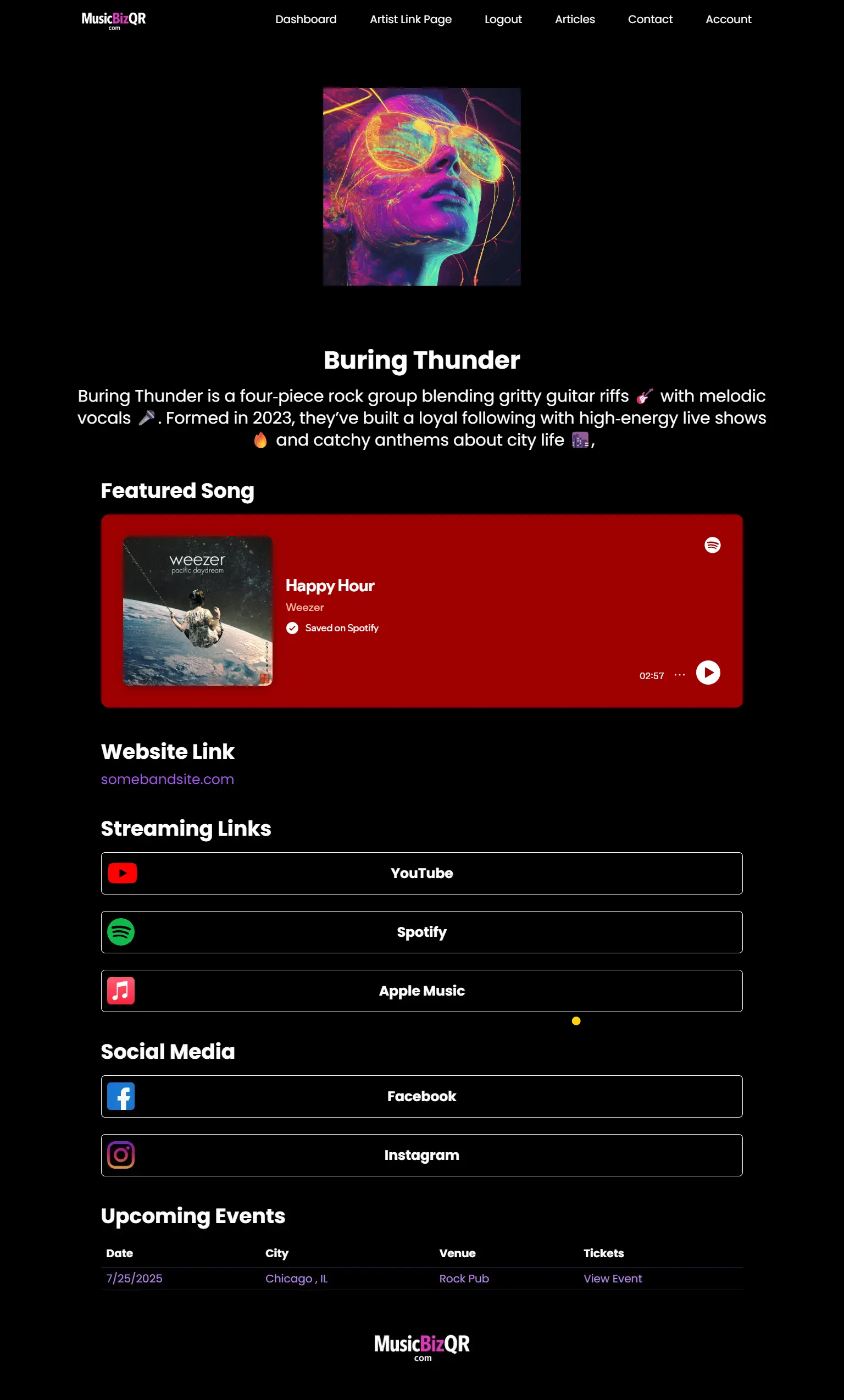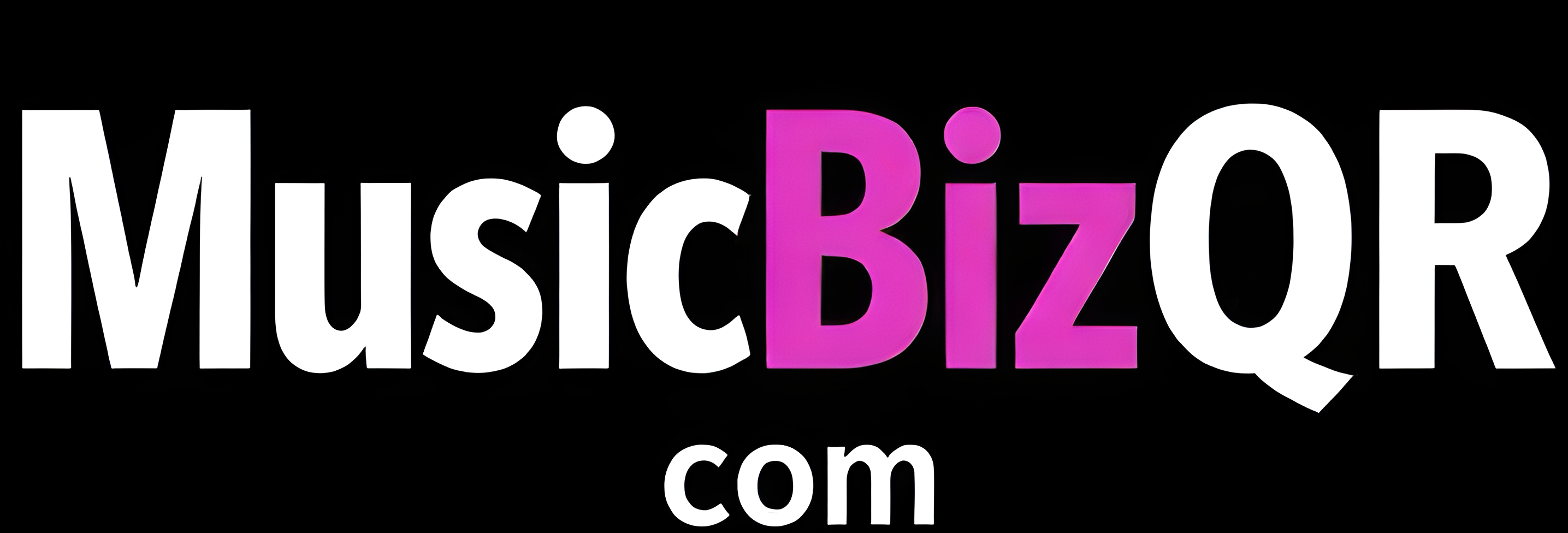How QR Codes Are Reshaping Music Discovery in 2025
How QR Codes Are Reshaping Music Discovery in 2025
It used to be word of mouth. Then it was the mixtape. Then the blogosphere. Now, in 2025, the torch of music discovery has been passed—unexpectedly but decisively—to the humble QR code.
Once relegated to restaurant menus and shipping labels, QR codes have become an essential part of the modern musician’s toolkit. They're the new mixtape cover. The new street flyer. The new backstage pass. Only this time, they're scannable, trackable, and capable of delivering experiences far richer than a 3-minute track. For artists, especially independent ones, this shift isn't just a tech trend—it's a lifeline.
The Moment Everything Changed
The post-pandemic music scene was starved for connection. Touring had paused, venues had shuttered, and fans were stuck behind screens. When live music returned, fans didn’t just want to hear a band—they wanted to connect with them. That’s when QR codes started appearing everywhere.
At first, they were just functional. Scan for merch. Scan for a setlist. Scan for a SoundCloud link. But in 2023 and 2024, platforms like MusicBizQR began enabling artists to create fully branded digital experiences—QR-linked smart pages that housed streaming links, videos, social profiles, exclusive content, and even AR interactions.
Suddenly, scanning a code didn’t feel like scanning a code. It felt like walking through a digital stage door.
Music Discovery Without the Algorithm
In the age of TikTok and Spotify’s infinite scroll, discovery is often dictated by the whim of an algorithm. QR codes break that cycle. They allow musicians to take discovery into their own hands.
Imagine this: you’re walking down a street in Nashville and see a poster for a band you've never heard of. Below the artwork, a beautifully designed QR code glows with brand colors. You scan it. Instantly, you’re on their digital profile. Their music auto-plays. Their top video plays in the background. Their next show is listed. You can follow them on Spotify with a single tap.
This isn’t a passive scroll through a feed. It’s a direct, intentional entry into a band’s world—one that they control.
From Physical to Digital and Back Again
There’s something ironic and magical about how QR codes are bringing physical media back into the discovery conversation. We’re seeing an explosion of physical marketing—posters, stickers, guitar cases, bar coasters—all embedded with dynamic codes.
The physical becomes a portal to the digital. A sticker on a subway pole leads to a YouTube premiere. A backstage laminate becomes a collectible with exclusive unreleased tracks. A T-shirt links to the band’s tour documentary. The fans who once traded burned CDs are now trading QR codes that unlock music video NFTs.
This fusion of worlds is changing how we define music discovery itself.
Hyper-Local, Hyper-Real
QR codes thrive in local ecosystems. In 2025, street teams and promoters are again relevant, but they’ve been upgraded with QR tech. A promoter at a festival can pass out cards with dynamic QR codes that track scans in real-time, A/B test landing pages, and convert fans at the moment of peak excitement.
Bands can even create region-specific landing pages. A code on a flyer in Los Angeles might greet fans with a different message and music than a code in Austin. This local customization is impossible to achieve through generalized online marketing—and it's deadly effective.
The Analytics Revolution
QR codes don’t just connect; they report back. Every scan becomes a datapoint: location, device, time of day, action taken. For the first time, artists have access to the kind of granular fan data once reserved for major labels.
Independent bands can now answer questions like:
- Which city had the most engaged fans last weekend?
- What time do fans most often scan our codes after shows?
- Which version of our smart link converts best for Spotify follows?
That kind of insight isn’t just useful—it’s transformational. It informs everything from tour routing to content strategy.
Reclaiming the Fan Relationship
The real revolution here isn’t just about reach—it’s about control.
In an era when platforms own the fan relationship, QR codes offer a direct channel. No middleman. No algorithm. Just the band and the fan. And that intimacy leads to loyalty.
Artists can deliver unique value: early access to new songs, exclusive content for VIP fans, AR overlays during live shows, or personalized shoutouts hidden behind QR codes only available at certain venues. It’s this kind of bespoke experience that fuels lasting fandom.
The Future Is Offline… and Online
It’s tempting to see QR codes as a short-term gimmick. But that would be a mistake. The deeper trend here is a return to physical world engagement—amplified by digital intelligence.
We’re entering an era where digital-first artists are realizing the importance of real-world presence. QR codes are the bridge. They reward exploration. They empower fans to be active participants, not passive consumers. And they give artists the creative tools to orchestrate that journey.
In the end, music discovery in 2025 feels less like stumbling through a playlist and more like being invited into a story. And more often than not, that invitation starts with a scan.
MusicBizQR is leading this movement. With our platform, bands aren't just placing links—they're building portals. They’re crafting experiences that convert casual listeners into devoted fans.
If you’re not using QR codes to drive your music discovery strategy, you’re not just behind the curve—you’re invisible to the very people trying to find you.
Built for Musicians. Powered by Smart Links.
MusicBizQR gives you a powerful landing page with streaming links, videos, social buttons, and real-time fan analytics — all from a single QR code.
- 🎯 Unlimited link clicks & analytics
- 📈 Track Spotify streams, YouTube plays, and QR scans
- 📱 Mobile-optimized artist pages
- 🚀 Create your first Smart Link in seconds

Related Posts
Discover the art and science of crafting QR codes that scan flawlessly every time—from sizing and contrast to placement and branding. This in‑depth guide walks musicians through each step with real‑world stories and expert tips.
Discover how bands can use QR code marketing to grow their fanbase, boost engagement, and increase revenue with real-world strategies and examples.
Get more scans at shows. Exact sizes, contrast, distances, and placements for QR codes on posters, stage screens, and merch—battle-tested.
Dynamic QR codes let artists edit links, track scans, and grow fan funnels—without reprinting. Here’s why every musician should use them (and how).
Learn how indie bands can boost merch sales at live shows using QR codes. Engage fans, simplify purchases, and track what works—all with MusicBizQR.
Discover how QR codes are helping musicians grow their audience, boost engagement, and drive merch and ticket sales in 2025.
Learn how musicians are using QR codes to collect email addresses from fans during concerts and tours. Build your fanbase with smarter tech.
Discover how artists are using QR codes at live shows to turn fleeting moments into lasting fan relationships and revenue.
Learn how musicians use QR codes to grow fans, sell merch, promote tours, and build owned audiences in 2026. A complete, modern QR code strategy guide.
Discover how musicians are using QR codes to grow their fanbase, sell more merch, and promote shows. Learn why QR is the most underrated tool in music marketing.
Discover how to craft landing pages that turn every QR code scan into streams, signups, or sales. Learn narrative‑driven best practices, real‑world examples, and pro tips for mobile‑first experiences that engage and convert.
Discover how a thoughtful QR strategy can transform fan engagement, drive traffic to your music, and unlock new revenue streams for independent artists. Learn best practices and real‐world examples to build your own QR roadmap.
Discover how musicians are using QR codes to turn festival sets and tour stops into major fan growth engines. Real-world tactics that convert.
Learn how musicians can use QR codes at live shows to drive fan engagement, stream growth, and merch sales. Step-by-step tactics that actually work.
Discover the story of how an unknown indie band used QR codes and smart fan engagement to grow their audience and turn local shows into viral momentum.
Discover how QR codes are helping artists grow their fanbase, boost streams, and drive merch and ticket sales. Learn how to use QR codes to build your music career.
Discover how QR codes are revolutionizing music marketing, empowering bands and artists to engage fans, drive streams, and increase revenue.
Learn how QR codes are revolutionizing music discovery, making it easier for fans to connect instantly with new bands, content, and experiences.
How QR Codes Are Redefining Music Promotion for Indie Artists
Explore how QR codes are transforming the music industry's gig economy by empowering independent artists to connect, monetize, and grow without middlemen.
Discover how musicians are using QR codes at live shows to build long-term fan relationships. Learn proven strategies that turn casual listeners into superfans.
Learn how to design and deploy a high-converting QR code campaign for your next album drop. Includes tips on branding, analytics, and maximizing engagement.
Learn how indie musicians can use QR codes strategically to generate income, boost merch sales, and create lasting connections with fans.
Discover how bands can turn every live show into a powerful fan engagement moment using QR codes. Learn tactics that convert concertgoers into lifelong fans.
Discover how bands and solo artists can use QR codes to supercharge tour promotion, grow their fanbase, and drive ticket sales with ease.
